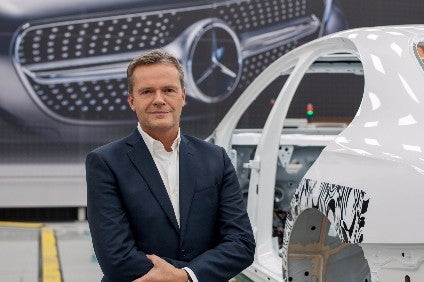
Daimler's Mercedes-Benz Cars will integrate future EQ (electric) models into series production at existing assembly plants on four continents, starting with Bremen followed by Sindelfingen in Germany.
The automaker said its new generation of electric vehicles would be based on architecture developed specifically for battery-electric models and would be be scalable and applicable across the model range.

Discover B2B Marketing That Performs
Combine business intelligence and editorial excellence to reach engaged professionals across 36 leading media platforms.
Which EQ model is produced at which factory will decided based on market demand.
"We are taking advantage of the opportunities offered by electric mobility and are significantly limiting the required investment," said the automaker's head of production and supply chain Markus Schafer.
"We have invested worldwide at an early stage in flexibility and technical equipment. With our plants in Bremen, Rastatt and Sindelfingen as well as the smart plant in Hambach, France, we now have four centres for the production of EVs."
He added the three German Mercedes-Benz car plants in Bremen, Rastatt and Sindelfingen would play a key role for electric mobility because they are competitive worldwide considering product range and innovation and wpuld "offer employees good prospects for the future".
"We very much welcome the decisions that have been taken. It is a key strategic goal of the works council that the German plants participate in the company's electric strategy. We see the decisions regarding investments and products as important milestones on this path," said Daimler works council chairman Michael Brecht. He said electric mobility and increasing digitisation would change factory tasks and jobs of the employees.
"It must be clear that, despite all challenges, the jobs are safe. This requires commitments for investment, development and volume of production on the part of the company."
Mercedes-Benz Cars already has experience integrating EVs into series production. Since April 2014, the B-Class electric has been produced at Rastatt on the same line as combustion engine vehicles. Smart launched a battery-electric in 2007 and, this year, the fourth generation Fortwo EV will go into production – coupé and convertible versions – on the same line as conventional drive models.
The EQ brand was unveiled at last year's Paris show and its EV model will be integrated into normal series production as additional drive versions at existing plants.
"Innovative and future-oriented production technology places new requirements on the employees, for which they are receiving intensive training," Daimler said in a statement. "Special qualification programmes are planned, for example in the area of high-voltage technology under production conditions. Junior management staff members are also being prepared in their training for working with the technologies of the future."
Mercedes-Benz Cars plans to launch at least 10 electric vehicles by 2025 in all segments from Smart city cars to large SUVs. The company reckons that, until 2025, the proportion of electric vehicles in its total unit sales will be between 15% and 25% though cautions "this is dependent on on the development of infrastructure and client preferences".
TecFactory and Electric Integration Centre (EIC)
Mercedes-Benz has established the TecFactory to coordinate design, development, procurement, sales and production. The various departments work closely at a very early stage of product development. All factories are connected, allowing central access to data and process control.
The new Electric/Electronic Integration Centre (EIC) prepares vehicle electric/electronic architecture for future challenges arising from electric drive, connected vehicles, autonomous driving and flexible usage concepts. Mixed teams will move into the EIC which will be located at Sindelfingen.
Production cultural change
The diversity of vehicle versions due to the various drivetrain technologies will require a highly flexible production system focused on humans with their tactile and cognitive abilities. By means of intelligent human-robot cooperation, the degree of automation will be reduced and workplaces in production will be ergonomically optimised.






